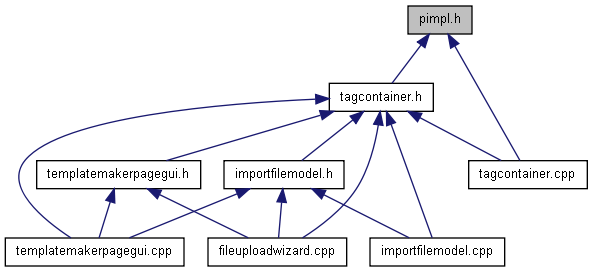This graph shows which files directly or indirectly include this file:

Go to the source code of this file.
Defines | |
| #define | PIMPL_DECLARE_PRIVATE(Class) |
| #define | PIMPL_DECLARE_PUBLIC(Class) |
| #define | PIMPL_PRIVATE(Class) Class##Private * const priv = priv_func() |
| #define | PIMPL_PUBLIC(Class) Class * const pub = pub_func() |
| #define | PIMPL_INITIALIZE(Class) |
| #define | PIMPL_UNINITIALIZE(Class) |
Detailed Description
QScopedPointer gebruiken voor priv_ptr zodat PIMPL_UNINITIALIZE niet nodig is is niet echt een optie. QScopedPointerDeleter is geimplementeerd met compile-time type checking, wat extra implementatie-constraints oplegt voor de public class. (zie docs voor forward declaration in QScopedPointer)
See also:
- http://zchydem.enume.net/2010/01/19/qt-howto-private-classes-and-d-pointers/
- http://labs.trolltech.com/blogs/2009/08/25/count-with-me-how-many-smart-pointer-classes-does-qt-have/
Define Documentation
| #define PIMPL_DECLARE_PRIVATE | ( | Class | ) |
Value:
private: \ inline Class##Private* priv_func() { return reinterpret_cast<Class##Private *>(priv_ptr); } \ inline const Class##Private* priv_func() const { return reinterpret_cast<const Class##Private *>(priv_ptr); } \ friend class Class##Private; \ void* priv_ptr;
| #define PIMPL_DECLARE_PUBLIC | ( | Class | ) |
Value:
public: \ inline Class* pub_func() { return static_cast<Class *>(pub_ptr); } \ inline const Class* pub_func() const { return static_cast<const Class *>(pub_ptr); } \ private: \ friend class Class; \ void* pub_ptr;
| #define PIMPL_INITIALIZE | ( | Class | ) |
Value:
priv_ptr = new Class##Private(); \ PIMPL_PRIVATE(Class); \ priv->pub_ptr = this;
Referenced by TagContainer::TagContainer().
| #define PIMPL_PRIVATE | ( | Class | ) | Class##Private * const priv = priv_func() |
Referenced by TagContainer::initialize(), and TagContainer::writeTo().
| #define PIMPL_PUBLIC | ( | Class | ) | Class * const pub = pub_func() |
| #define PIMPL_UNINITIALIZE | ( | Class | ) |
Value:
PIMPL_PRIVATE(Class); \ delete priv;
Referenced by TagContainer::~TagContainer().
 1.7.1
1.7.1